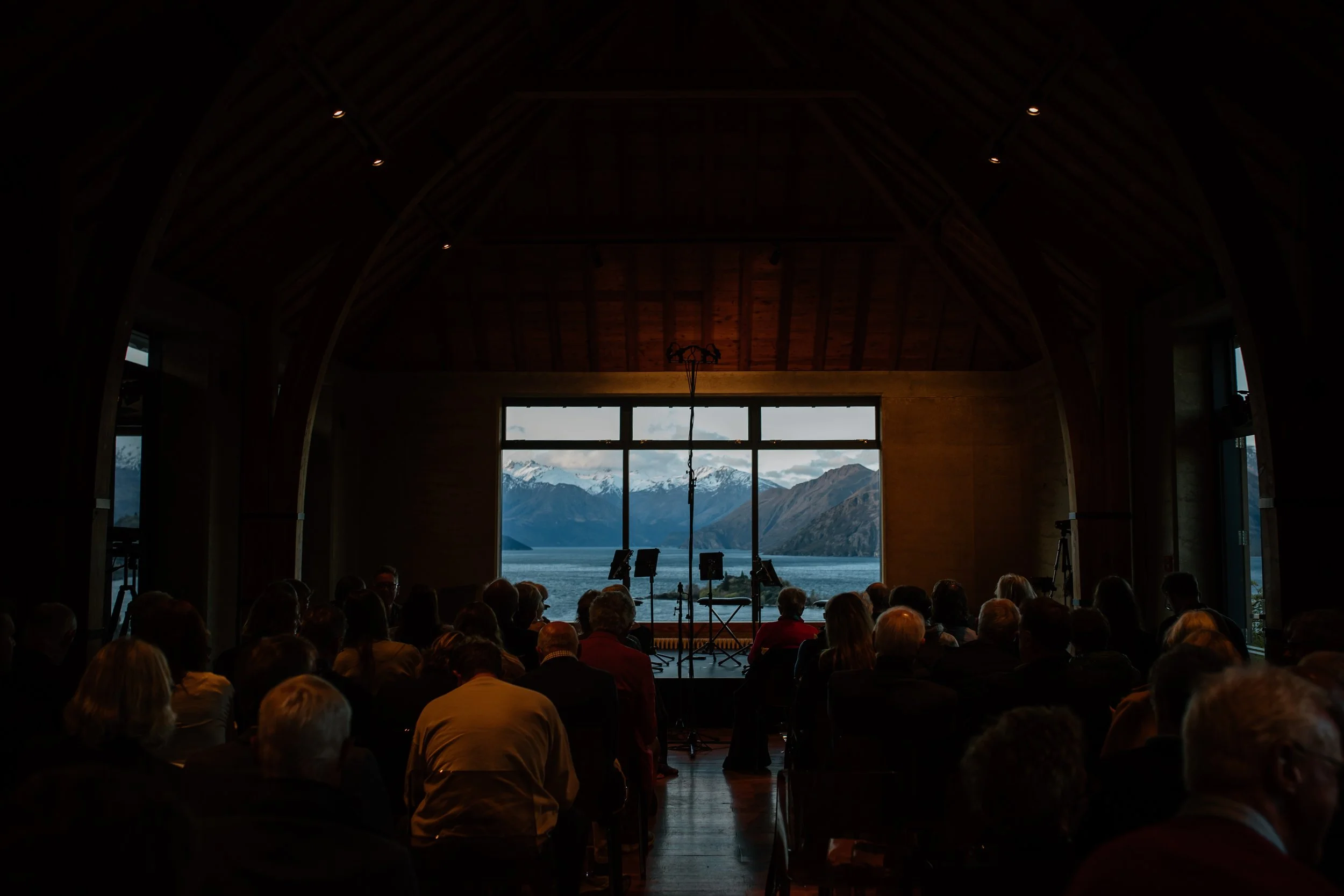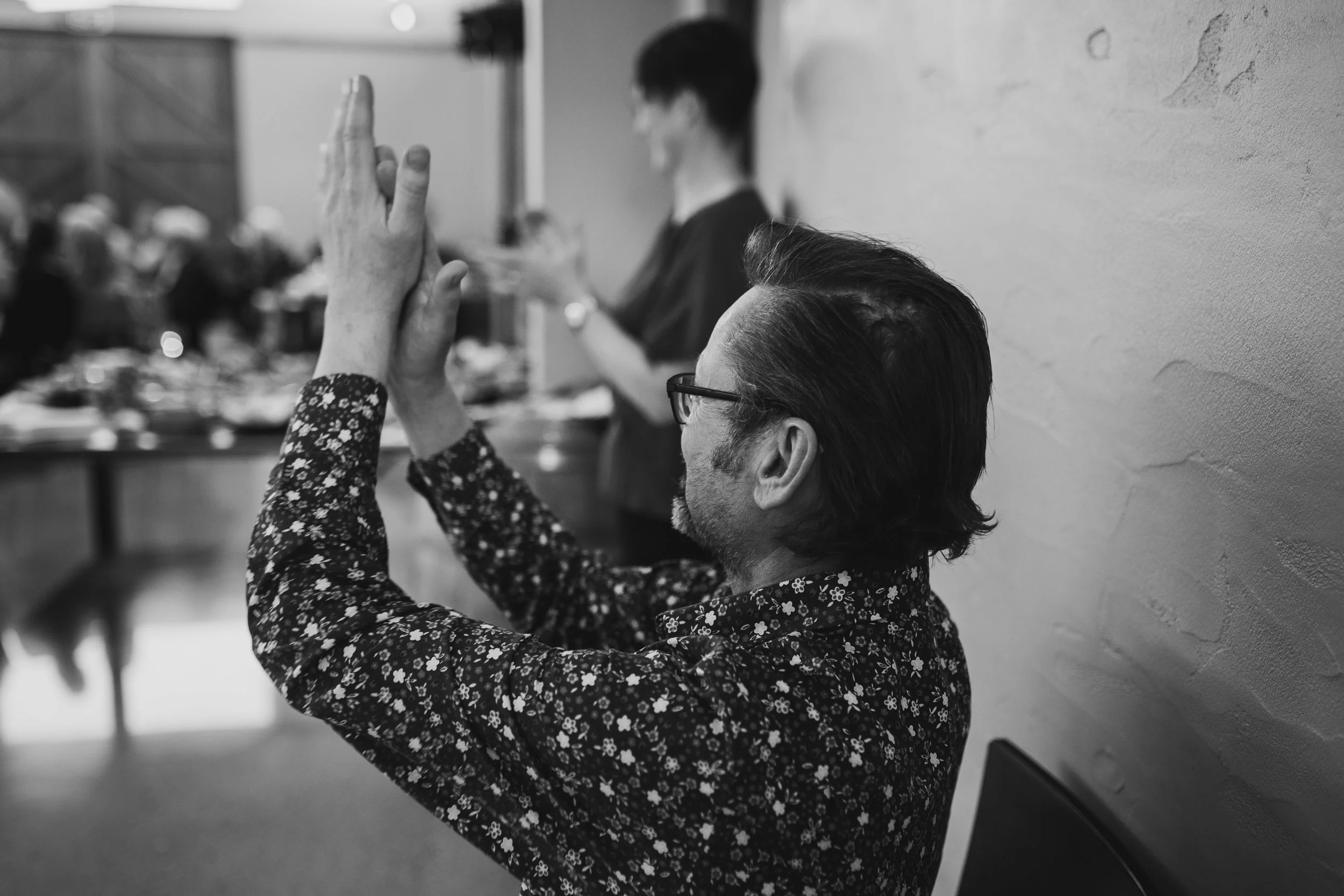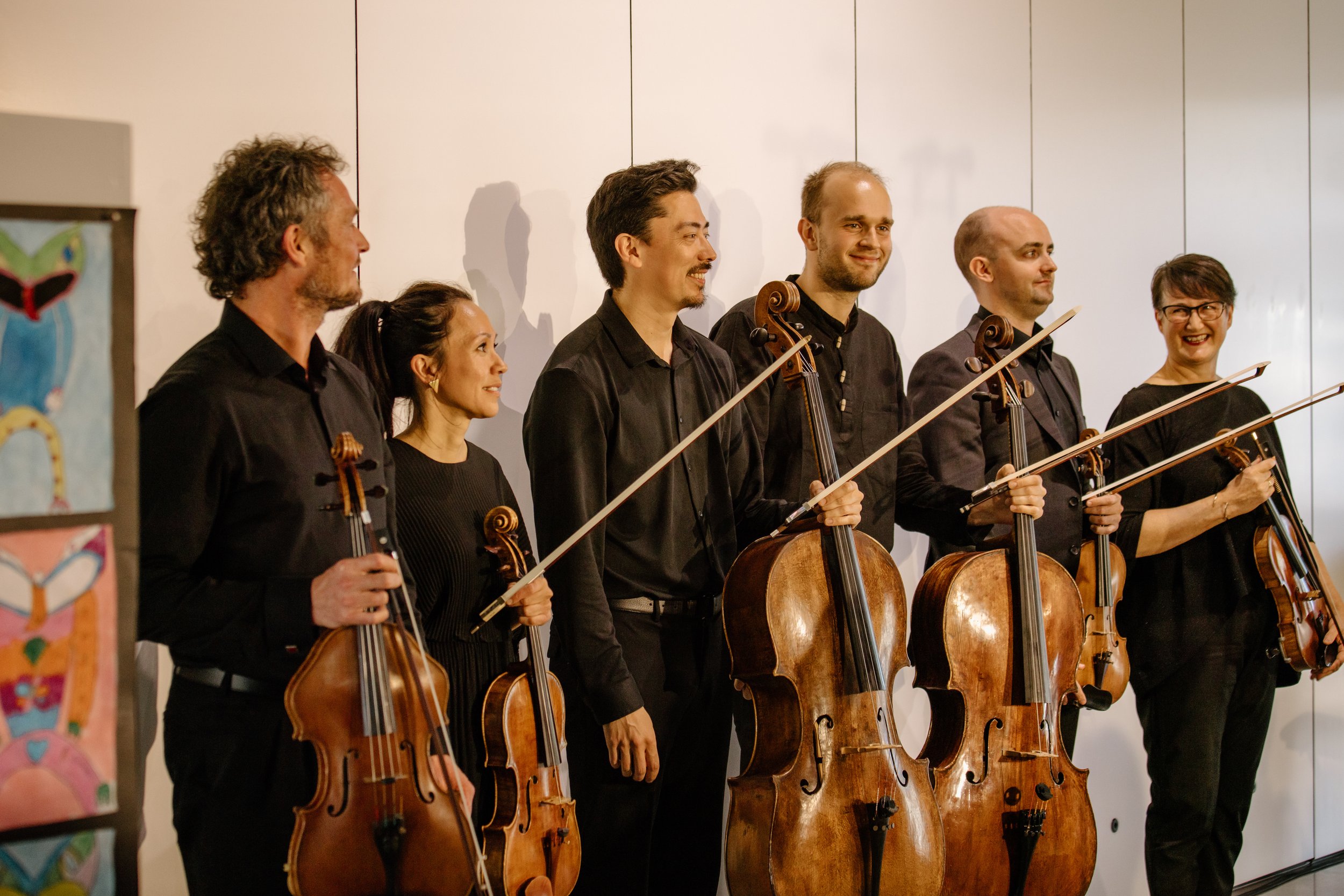At the World’s Edge: musical bonfire in the mountains
Violinists Benjamin Baker (Artistic Director) and Justine Cormack (Festival Director) in Cromwell during the AWE Festival 2022
Photo credit: Nat Symonds
A festival is a gathering of artists building a bonfire together. The audience comes, attracted by the glow. The most recent musical bonfire in New Zealand was built last year in the Central Lakes District of Otago by two musicians intrepid enough to launch an international chamber music festival in the middle of a pandemic.
They called their festival At the World’s Edge. Before the 2021 event I talked to violinist Justine Cormack about her vision for the AWE Festival, developed with London-based Kiwi violinist Benjamin Baker. While I wrote that story, I made my plan to attend this year and experience the warmth of AWE for myself.
The AWE directors certainly had to hold their nerve in 2021. Less than two months before the inaugural event, New Zealand went into lockdown, faced with the Delta strain of the coronavirus. Auckland’s lockdown lasted more than 100 days. Some festival artists were trapped there, causing inevitable changes to personnel and programmes, but the flames were kept alive. That courage to go ahead translated this year into bold programming and an expanded festival, with six thematically linked concerts, a well-designed programme of free talks and community events and an education programme in schools.
AWE is the third and newest chamber music festival in Aotearoa New Zealand, all three combining our finest musicians with international colleagues. The popular Adam Chamber Music Festival in Nelson, a biennial February fixture for many years, is the longest, usually a 10-day event that shrank to a four-day “Celebration” during the pandemic years. The next full-length “Adam” has been postponed till 2024. Musicians Victoria Jones and Wilma Smith are artistic directors of the Martinborough Music Festival, inaugurated in 2017, an annual September weekend in the charming Wairarapa village. Offering high-quality artists and concerts alongside school programmes, it’s another festival that has bravely kept its banner aloft despite multiple disruptions.
AWE established some points-of-difference immediately. Located in an awe-inspiring landscape, the festival moves around three venues in different towns, Rippon Hall in Wanaka, the new cultural facility Te Atamira in Queenstown and the Cloudy Bay Shed in Cromwell. All are small, intimate and acoustically responsive, and all pay homage to the superb natural setting.
An expectant audience at Rippon Hall in Wanaka.
Photo credit: Nat Symonds
The new festival has also taken a strong curatorial position, which Baker and Cormack explained in their handsome programme booklet. “Beginning our journey in Wanaka, every work in every concert traces a path through our themes of Solitude and Togetherness, taking us on a journey of sight and sound that leads to our final performance in Queenstown.” The approach, with “Waypoints” for each programme, invited audiences into the musical relationships between performers and composers, drawing out the interplay of concepts like creative solitude, freedom, loneliness and grief, alongside love, hope and forgiveness. Without a hint of condescension or mawkishness, these beautifully constructed programmes were deeply moving and profoundly inclusive.
Some works acknowledged the past three difficult years. In an introductory conversation at the concert “Nine Seas Away”, three Kiwi artists, baritone Julien van Mellaerts, librettist Paul Horan and composer Gareth Farr, talked about their feelings of loss and separation from home, about the important funerals they couldn’t attend and coffins they couldn’t lift. The three collaborated remotely from London, Melbourne and Wellington on Where Will They Bury My Bones, premiered from London in March by film and having its first live outing at AWE. It was a searingly emotional performance, tears not far away for performers and audience.
The first live performance of Gareth Farr’s Where Will They Bury My Bones
Musicians (from left) Ben Baker and Enshean Lin (violins), Sarah Watkins (piano), Julien van Mellaerts (baritone), Taliesin Amoore (viola), Jack Moyer (cello),
Photo credit: Nat Symonds
Another AWE initiative is appointing a composer-in-residence. Salina Fisher held the role in 2021 and Farr this year. His music was included in every concert, seven works in all, including a fine new commission for violin and cello, Four Postcards from the Lakes. The festival’s strong commitment to New Zealand composition was evident all week. Victoria Kelly’s lovely Songs without Words featured alongside Farr’s Postcards in a programme called “Tranquil Bay” and, in “Nine Seas Away”, an appealing and adventurous new string quartet, Timatanga, by young composer Eva Bedggood, took its place alongside two Farr works. Fisher returned this year as mentor to Bedggood, who is the first AWE Emerging Composer.
Composer Gareth Farr applauds the performance of one of his Postcards from the Lakes at the Cloudy Bay Shed in Cromwell
Photo credit: Nat Symonds
AWE also has an Emerging Artists programme, with places for four exceptional young musicians, this year violinist Enshean Lin, violist Taliesin Amoore, cellist Jack Moyer and pianist Otis Prescott-Mason. They participated in ensembles with the seasoned professionals and were mentored in the process. Violinist Wilma Smith was one of those mentors and her own musicianship and her generous support of young talent were both evident in the stylish Haydn String Quartet she played with three of them. All will have bright futures; one described the AWE experience to me as “life-changing”.
Violinist Wilma Smith with Emerging Artists at the AWE Festival
Photo credit: Nat Symonds
Of course, AWE also programmed many chamber works by much-loved composers from history. We heard the music of J S Bach, Haydn, Mendelssohn, Brahms, Samuel Barber and Richard Strauss, including some of the latter’s lieder sung with heart-breaking beauty by van Mellaerts, with Prescott-Mason a sensitive accompanist.
In the gallery space at Te Atamira we were treated to a magnificent performance of Strauss’s big Piano Quartet in c minor, written by a 20 year-old composer and full of late Romantic grandeur. The accomplished Watkins dealt splendidly with the demands of that piano-heavy “Free but Lonely” programme, which was performed twice in one day. My only musical quibble was an occasional balance problem with an over-loud piano in an acoustically bright venue.
One beautiful spring evening the festival moved to the Cromwell winery setting of the Cloudy Bay Shed. Baker and his European colleague, remarkable Polish cellist Maciej Kułakowski, played a four-set programme called “Sei Solo”, interspersing Bach’s solos and duos with three of Farr’s Postcards and other works by lesser-known European masters. Based on the waypoints “alone, partnership, courage and eternity”, the programme was also curated around the tasting notes of the four different wines served to the audience before each set.
Violinist Benjamin Baker and cellist Maciej Kułakowski playing music by J S Bach as the light faded at the Cloudy Bay Shed.
Photo credit: Nat Symonds
Was this frivolous? Not at all. Baker introduced each set by reading the tasting notes aloud without a hint of irony, and it wasn’t hard to agree that music, like wine, can be “crisp and balanced”, “zesty and vibrant” or “concentrated and elegant”. Outstanding performances, an interesting on-stage chat between Farr and Cormack, an incomparable setting as the sun set and the light faded, and fine wine and food combined in a memorable evening for the delighted audience.
The final programme in Queenstown, “Into the Night”, began with another enterprising choice. Passionate, feisty British composer Ethel Smyth wrote her highly original Piano Trio in 1880 and it was played with romantic flair by Baker, Watkins and cellist Ken Ichinose. Farr’s String Octet followed, a great work for the eight fine string players of the event’s line-up and an opportunity to hear again a commission first played at the Adam Festival in 2017.
The musicians who played Schoenberg’s Verklärte Nacht received a standing ovation in the final concert of the AWE Festival
(from left) Rob Ashworth and Amanda Verner (violists), Ken Ichinose and Maciej Kułakowski (cellists), Ben Baker and Justine Cormack (violins)
Photo credit: Nat Symonds
In a week of musical highlights, my own top pick was the culminating performance of Schoenberg’s string sextet Verklärte Nacht (Transfigured Night). Led by Baker, in another demonstration of his outstanding artistic leadership, alongside Cormack, the essential local driving force for AWE, with violists Amanda Verner and Robert Ashworth and cellists Kułakowski and Ichinose, it was the most moving performance I’ve heard of this often-played work. The scene was set by a magical offstage string quartet evoking regrets and tears with the music of Josquin des Prez and John Dowland. The Richard Dehmel poem that inspired Schoenberg was read by the musicians, each speaking in turn while taking their places on the stage. The performance was almost reverent in its angst-ridden, impeccably timed beauty and richly deserved the prolonged standing ovation that ended the concert and festival.
Awe-inspiring indeed! Put the 2023 dates in your diary now and join the AWE mailing list.
At the World’s Edge Festival 2022, Central Lakes 8-21 October 2022.
Festival Director Justine Cormack, Artistic Director Benjamin Baker, Education Leader Marike Kruup. Festival artists: Benjamin Baker, Justine Cormack, Wilma Smith and Marike Kruup (violins), Amanda Verner and Robert Ashworth (violas), Maciej Kułakowski and Ken Ichinose (cellos), Sarah Watkins (piano), Julien van Mellaerts (baritone).
At the World’s Edge Festival 2023, Central Lakes 7-20 October 2023. More information here







